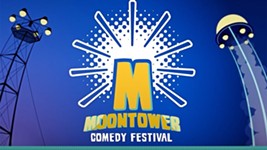Moontower Interview: Hasan Minhaj
Talking The Daily Show, storytelling, and the world of comedy
By Robert Faires, 10:09AM, Fri. Apr. 24, 2015
Getting hired as a correspondent for The Daily Show With Jon Stewart was, without question, a great break for Hasan Minhaj. But it isn't as if the 29-year-old comedian was sitting around waiting for his cell to ring. This is a guy who in just a few years has made a mark in stand-up, onstage storytelling, web series, documentary film, and MTV.
From his work with The Moth to his web series The Truth With Hasan Minhaj to the MTV show Failosophy to the ABC Family series State of Georgia to his solo performance Sakoon, about being a first-generation Indian-American (which, along with its companion screenplay Paint the Town, was chosen for transmedia development at Sundance Institute’s New Frontier Story Lab), Minhaj has covered the world of comedy. No, wait, he covered the world of comedy in Stand-up Planet, the documentary funded by the Bill and Melinda Gates Foundation that focused on comedians in South Africa and India. Man, you need a passport just to keep up with this guy.
Fortunately, Minhaj has made it easier for those of us in Austin to do that this weekend by joining in on the fun at the Moontower Comedy & Oddity Festival. In advance of his appearance here, he took time for an email interview with the Chronicle.
Austin Chronicle: What new comedy muscles are you stretching on The Daily Show? Have you had to make any adjustments to the way you write?
Hasan Minhaj: The biggest adjustment I've made is in focusing on the subject matter itself, establishing an argument, and then writing jokes. So much of TDS is taking a very serious news issue, establishing an argument, then escalating full on into joke-ville. That was so different than when I was writing jokes before.
AC: Have you had that moment yet where you felt, "Yes! Everything about that bit worked! This is so where I should be"? Or, on the other end, have you had a moment when you were thinking, "That's it. After that bit, everyone knows I'm in the wrong place"?
HM: I haven't had those feelings, but I have had the feeling after writing a really solid joke and thinking, "I'm probably not going to be able to write another joke like this. Oh well, I might as well give up." But I've found the 90-10 rule to be pretty true; 90 percent of what I come up with and write down is kinda "eh," and then somehow, someway, 10 percent of it happens to work out really great in my act.
AC: Has your work on The Daily Show influenced your approach to stand-up? What are you learning?
HM: I've learned to start from a really sound argument; boil down the essence of what you're trying to say, then build your humor around that. Rather than starting with "this sounds funny," and going from there.
AC: Your career has already taken you in so many directions: stand-up, documentary film, video, a solo play, a screenplay, now this multi-platform development of Sakoon at Sundance. Do you feel any need to step away from one in order to do others? And why does stand-up stay in the mix?
HM: I think they're all pretty related to each other; stand-up and storytelling is the main driving force in all of these projects, so I'm just focused on using comedy as my driver in multiple, different mediums. Also, when I'm working on a project, I'll do everything I can to focus all my energy on that one specific project. Once that's done, I put it out, wish for the best, and then move on to the next thing that interests me.
AC: Stand-Up Planet was a chance to give some exposure to comedians outside the U.S. Did you see any qualities in those comedians that gave you a new perspective on the form, or at least how it's performed in the States? Did you take any inspiration from the comedians you met for that?
HM: It was really inspiring. Two things really blew me away:
One thing I found very interesting about comedians around the world was their knowledge of stuff outside of their own culture and comfort zone. That's not very common in the States. We produce our own soft power, which is pop culture, but we rarely try to absorb and learn information from other cultures and countries. It's a one-way street. For comics around the world, it's more of a two-way street. That vibes with me. I want to do more of that.
The other thing that blew me away is how comics around the world were creating industries for themselves where they otherwise didn't exist. The traditional Hollywood system is pretty rigid, but the film scene in, say, South Africa is booming with a lot of possibilities. If you have the cameras and reasonable capital, you can put your film in theatres next to Guardians of the Galaxy. A great example of that was Kagiso Lediga's film Blitz Patrole. It made me think, "If something doesn't exist, you can just make it."
Hasan Minhaj appears at Moontower Friday, 8:15pm at the Parish, 214 E. Sixth, and 10:30pm at the Google Fiber Stage, 201 Colorado; and Saturday, April 25, 8:30pm at Vulcan Gas Company, 418 E. Sixth; and 10:30pm at Velv Comedy Lounge, 521 E. Sixth. For more information, visit www.moontowercomedyfestival.com.
A note to readers: Bold and uncensored, The Austin Chronicle has been Austin’s independent news source for over 40 years, expressing the community’s political and environmental concerns and supporting its active cultural scene. Now more than ever, we need your support to continue supplying Austin with independent, free press. If real news is important to you, please consider making a donation of $5, $10 or whatever you can afford, to help keep our journalism on stands.
Robert Faires, June 10, 2021
Robert Faires, Aug. 4, 2020
Sept. 24, 2021
Sept. 17, 2021
Moontower Comedy & Oddity Festival, Hasan Minhaj, The Daily Show With Jon Stewart, Failosophy, The Truth With Hasan Minhaj, Stand-up Planet, Moontower Comedy 2015











